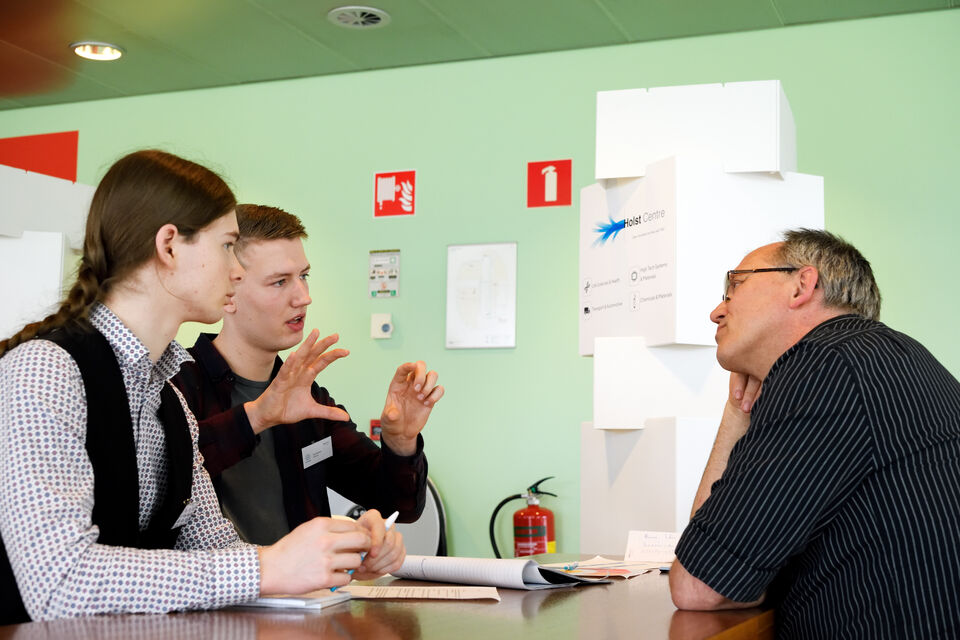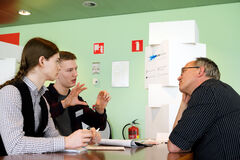Students design backpack that ‘sees’ for the blind
When it comes to navigation aids, there is little more on offer for blind and visually impaired people than guide dogs and white canes. Team aWeare, participating in the TU/e Contest, is trying to add to this limited list by developing a ‘wearable for navigation’. This has resulted in a backpack for the visually impaired that gives feedback on the surroundings. Test subjects are still needed.
The initial idea was perhaps a little wild, but team aWeare is getting ever closer to producing a realistic navigation system that will help the visually impaired. “At first we considered a vest with a sonar system, inspired by Tesla,” says Mechanical Engineering student Bo Fuentes. “We weren't so naive as to think that we could simply send a mail and request Tesla's techniques, but we know that it is possible to digitally recognize the local environment and the obstacles it contains.”
They came up with their idea for the USE course Engineering & Entrepreneurship. When they struck up a conversation with Steven van Huiden of STARTUP/eindhoven he drew to their attention the TU/e Contest. Useful, is how team member Tom Kersten (Industrial Engineering and Management Sciences) describes this competition: “It gives us access to companies and we aim to get as much feedback as possible on our ideas. In other words, free information.”
aWeare had already taken the initiative and contacted healthcare organizations for blind and visually impaired people. Kersten: “Bartiméus is currently developing a 'guide lines for the blind' app. Visual data is stored with the aid of a 3D camera installed in a smartphone. The sticking point is that it is still difficult to convey this information to the visually impaired person. It is tricky if someone has to hold on to a phone the whole time. Bartiméus is actually seeking a portable solution in which to apply this technique.”
No earpieces
The four students believe there could be many advantages to using a backpack; the handles could convey information about the environment to the user by way of vibrations and possibly sound. “Conversations with designer Simon Dogger, who is himself blind, have taught us what we need to pay attention to. He said, 'blind people are ordinary people’, meaning that they don't want to be any different, want to be able to do their own thing,” says Kersten. And that means they don't want to wear a special vest the whole day, or carry visible speakers on their shoulders.
“Nor must the new aid disrupt the person's regular habits. For visually impaired people, their hearing is essential. We can't ask them to wear earpieces,” says Kersten. “A backpack is an inconspicuous and convenient item to take with you when you go outdoors.”
Speed dates
At the speed dates organized by the TU/e Contest, Kersten spoke with someone from the Holst Centre, an open innovation R&D center at TNO. “That was where I heard that a backpack has another major advantage in the world of wearables. Whether or not a product has a chance of succeeding depends on how washable it is, and a bag doesn't have to be put in the washing machine every day.”
Now aWeare needs to research which market niche best suits their idea. “Would that be people who have been visually impaired all their lives, or people who have become visually impaired? People who are both deaf and blind, or blind people who can hear? We can use questionnaires to find out,” says Fuentes. “But for the field testing of our prototype - which isn't yet completely ready - we need test subjects.”
The students have run up against the problem that they do not know many visually impaired people. Through Bartiméus they are in touch with six people, but more test subjects are needed. Fuentes: “We don't yet know where visually impaired people meet up, or whether in fact they do meet up.” Kersten suggests they should organize an event themselves.
Anyone who has tips for aWeare as to how they can get in touch with blind or visually impaired people can send a mail. The final of the TU/e Contest will be held on May 22nd. “Even if we don't win, we'll carry on working on this product because there's a gap in the market for it.”



Discussion